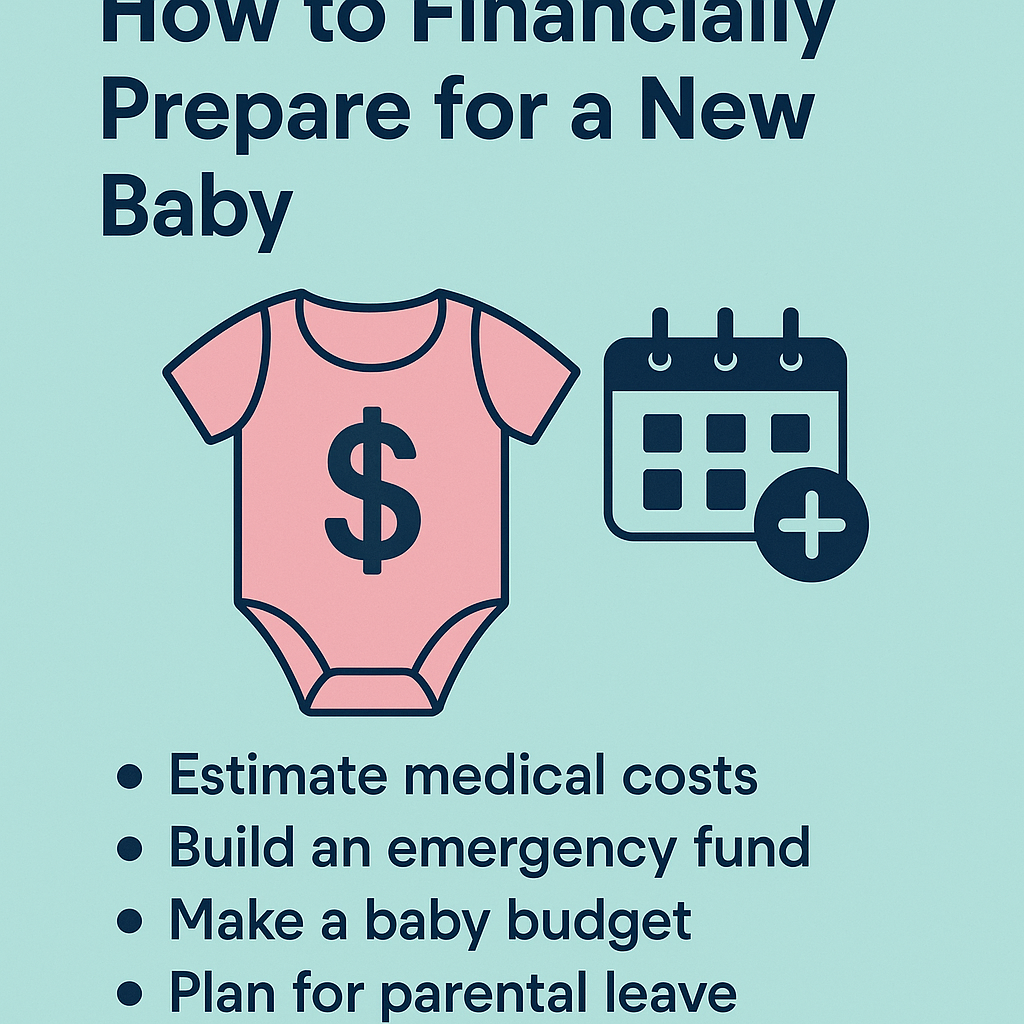Why Financial Planning Matters Before the Baby Arrives
Welcoming a new baby into your family is one of life’s most joyful milestones — but it also comes with a significant financial shift. From medical costs to diapers and future childcare, your budget is about to change in ways both expected and unexpected.
The good news is that with thoughtful preparation, you can handle the costs confidently and reduce stress during a time that should be focused on bonding and joy. Here’s how to financially prepare for a new baby step by step.
Understand the Upcoming Costs
Start by researching and estimating the key expenses you’ll face in the first year. These may include:
- Prenatal care and delivery (if not fully covered by insurance)
- Baby gear (crib, stroller, car seat, changing table)
- Diapers and formula (if needed)
- Clothes and baby toiletries
- Childcare (if returning to work)
- Health insurance for the baby
- Pediatric visits and vaccinations
Understanding these costs upfront gives you a target to plan and save for.
Review Your Health Insurance
Before your baby arrives, call your insurance provider and ask:
- What’s covered for prenatal care and delivery?
- What hospitals and doctors are in-network?
- What’s the cost of adding your baby to your policy?
- Are there co-pays for pediatric visits or immunizations?
Understanding your coverage helps prevent surprise bills. If you’re uninsured or underinsured, look into government-supported options depending on your location.
Start or Increase an Emergency Fund
Babies bring surprises — not just cute ones. Having a solid emergency fund protects you from unexpected costs like:
- Hospital complications
- Last-minute baby gear needs
- Income gaps if you take unpaid leave
Aim to save at least 3–6 months’ worth of essential expenses. If that feels like too much, start with a $1,000 goal and build from there.
Create a Baby Budget
Add a new section to your household budget for baby-related expenses. Break it into categories like:
- One-time purchases (furniture, gear)
- Monthly recurring expenses (diapers, wipes, formula)
- Medical costs
- Childcare
List what you need now vs. what can wait. You’ll quickly see where to allocate resources and where you can be frugal.
Sign Up for Freebies and Baby Discounts
There are many programs that offer free baby samples, diapers, and coupons. Look for:
- Free welcome boxes from registries (Amazon, Target, Walmart)
- Diaper reward programs (like Pampers Club)
- Manufacturer coupons for formula, wipes, and gear
- Hospital freebies during your stay
These perks can save you hundreds in the first few months.
Avoid Overbuying Baby Gear
It’s easy to get caught up in the excitement and marketing — but babies don’t need everything on the store shelf.
Stick to essentials:
- A safe place to sleep (crib or bassinet)
- Car seat (required by law)
- Diapers and wipes
- Bottles and formula (if not breastfeeding)
- A few sets of clothes
- A way to bathe the baby
Avoid splurging on fancy gadgets and extras until you know what your baby actually likes and needs.
Explore Secondhand Options
Babies outgrow everything quickly, which makes secondhand shopping a smart financial move.
Look for gently used items:
- Baby clothes
- Swings and bouncers
- High chairs
- Maternity clothes
Check Facebook Marketplace, family and friends, thrift stores, and consignment shops. Just make sure safety items like car seats and cribs meet current standards.
Plan for Parental Leave
Check with your employer about:
- Maternity/paternity leave policies
- How much time is paid vs. unpaid
- Whether you’ll need to use vacation or sick time
- Short-term disability options
Knowing what income to expect helps you adjust your budget accordingly. If you’re self-employed, start setting aside extra funds to cover your leave period.
Review Your Insurance Policies
A new baby is a good time to update your:
Health Insurance: Add the baby to your policy within the time window (usually 30 days after birth).
Life Insurance: Consider term life insurance for both parents — even stay-at-home parents.
Disability Insurance: Optional but valuable in case you’re unable to work after the baby is born.
Also, update your beneficiaries and emergency contacts if needed.
Start a Baby Savings Fund
Create a separate savings account labeled “Baby Fund” and start setting aside a small amount each week. Use it for:
- Upcoming purchases
- Pediatric co-pays
- Unplanned costs
Even $10–$20 per week adds up quickly and gives you peace of mind.
Prepare for Childcare Costs Early
If you plan to return to work, start researching childcare options early. Prices and availability vary widely. Consider:
- Daycare centers
- In-home daycare
- Nannies
- Shared nanny arrangements
- Help from family members
Many facilities have waitlists, so start looking months in advance and compare pricing.
Plan for the Long-Term
As your baby grows, your financial needs will evolve. While it’s not urgent, it’s wise to start thinking about:
- Opening a savings or investment account for your child
- Starting a college savings plan
- Teaching basic money values as they grow
A solid foundation now sets your family up for a healthy financial future.
Enjoy the Moment, But Stay Grounded
Financial stress can take away from the joy of welcoming your baby. Preparing in advance helps you enjoy those precious early months without constant money worries.
Remember, babies need love, attention, and care more than anything you can buy. With thoughtful planning and a realistic budget, you’ll be ready to give them all of that — and still protect your finances.
